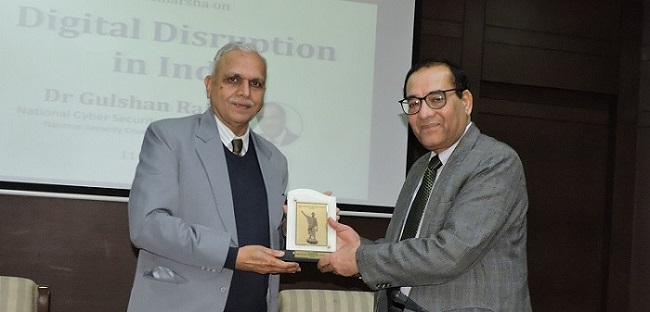With the recitation of peace mantra, the monthly tradition of Vimarsha was flagged off on 11th February 2019, at the Vivekananda International Foundation (VIF) with a discussion on ‘Digital Innovation and Disruption in India’, which was spearheaded by Dr. Gulshan Rai, National Cyber Security Coordinator, National Security Council Secretariat.
Director, Dr. Arvind Gupta, introduced Dr. Rai as a pioneer in the field of cyber security as he ably heads the position of National Cyber Security Coordinator, National Security Council Secretariat. Moreover, he has many achievements in his credit like he was the Director if CERT-In for 10 years, helped set up cyber training institute, and last but not the least, was an esteemed member of B.N Srikrishna committee on Data protection.
Dr. Rai recounted the emergence of Cyber and Internet, and said that the word ‘Cyber’ was unknown to us a decade ago but any infrastructure cannot be imagined without Information and Communications Technology (ICT) today. It has become so widespread and ubiquitous that digital economy contributes about 15% of the world GDP (USD 12 million). Looking at the Indian picture, he pointed out that digital economy of India was about 8% of GDP and expected to rise by 30%. However, with the above success, a problem does exist, i.e. nearly 50% of the jobs that would exist in five years from today are not available in the present. This means that we need new skills for the emerging jobs.

Digital transformation, according to him, has a wide coverage which includes innovative technologies and concepts like Artificial Intelligence, Internet of Things, machine translation, Augmented Reality (AR) and Virtual Reality (VR), robotic process automation, Cloud, cyber security, Block Chain, Advanced Analytics, etc. Cyberspace has engulfed majority of the spheres like strategic, economic, political, social, commercial, etc. It works as a social scene, financial marketplace and political battleground.
Highlighting the increasing cyber penetration in majorly of all the spheres of a state, Dr. Rai opines that it has made a state susceptible to fifth domain of warfare - cyber warfare - because cyber and physical are converging which can lead to disruption and destruction. Of course, it is much complex than other domains and its complexity is increasing with time. With some facts, he said that this innovation was not stopping here because speed was the new currency for business. Therefore, the focus of emerging start-ups is to build consumer applications to provide convenient services. In India, there is a total of approximately 19,000 start-ups registered presently.
Moving on, Dr. Rai switched to the consequences of cyber/digital disruption by saying that it was time is now to act. He deliberated that digital disruption was not gradual but radical which possess the capacity to change the status quo. This disruption has three archetypes, disruptors (those who lead), followers (those who adopt), laggards (those who ignore). In coming times, he predicted that digital strategy will merge with corporate strategy and lead the economic sphere. He has also recognised that we lived in an asymmetric cyber space where data is traded and bought which has eventually become a strategic asset. He observed that there was a wide gap between digitisation and safety measures and it would be a cause of disruption. This has cascading effect on interconnected systems and hazardous spiralling threats like initially intrusive attacks (virus), disruptive attacks (DNS, sophisticated malware attacks), and in future, destructive attacks. Same technology which is built for different kind of innovation is causing different kind of disruption and destruction because ethics of yesterday are not applying to technologies of today. Hence, these challenges need to be dealt with security configuration management that is consistent, comprehensive, continuous and collaborative. Impact of digital revolution will not just be on business but on national and economic security if we are unable to cope up with revolution.

Dr. Rai rightly explored the impact of digital revolution. He suggested that there was mounting culture of autonomy (professional development, communication autonomy, entrepreneurship, socio political participation, personal), rise of social networking sites, mass communication, communication power, transformation of politics, and security of ICT assets in the future with increasing complexities. On the international front, the Budapest Convention was framed to deal with challenges of digital revolution. However, he said that India was not a signatory because the Convention gave leverage to certain group of countries. Furthermore, according to Dr. Rai, it transcends the technological boundary and has become a geopolitical issue in the international arena.
In his concluding remarks, the esteemed speaker posed certain questions to the audience to ponder, like, “Is India ready to face challenges of digital innovation?”, “How do we prepare ourselves for technologies and policies and how to put those in practices?”, “Where are we. How are we addressing safety issues?”



Post new comment